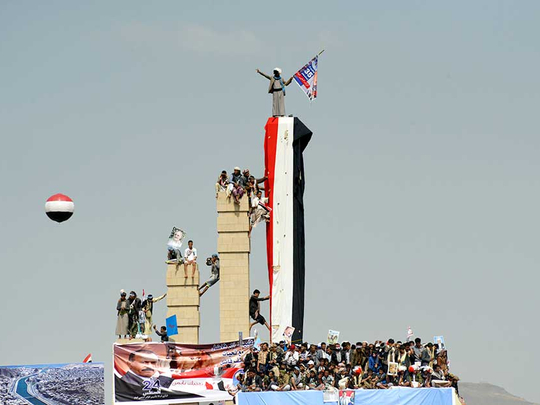
Al Mukalla: Tension between supporters of Yemen’s ousted president Ali Abdullah Saleh and the Al Houthis is raging unabated for the second week despite placatory gestures from their leaders.
Both sides have exchanged accusations over tapping state funds and a plot to kill the ousted president on Thursday. Nabiel Al Soufi, a pro-Saleh journalist, said on Friday the Al Houthi movement deployed dozens of snipers on the roofs of buildings in vicinity of Sabeen street where thousands of Saleh’s supporters were rallying to mark 35th anniversary of General People’s Congress party. Tribesmen and security elements loyal to Saleh, Al Soufi said, besieged the Al Houthis, forcing them to retreat.
Hours after the end of Saleh’s celebration, dozens of armed vehicles carrying masked men in military uniform slowly paraded in the site chanting Al Houthi slogans and carrying the movement’s flag. Local military experts said that the movement flexed muscles in Al Sabeen to send a message to Saleh that they were more powerful than him.
Hostility between the supposed allies has risen to the surface in recent days when Saleh announced arranging a public rally on August 24 to mark his party’s birthday. The Al Houthis perceived the rally as a challenge to their authority and accused Saleh of not sending his supporters to battlefields to fight Yemen forces and the Saudi-led coalition.
Saleh’s supporters responded by saying that Al Houthis plundered more than $4 billion from the state’s treasury, covertly engaging in talks with American officials in Oman and amending primary and secondary schools curriculum.
“The dispute between Al Houthis and Saleh is the end of common interests that brought together the coup alliance. It is a sign of reaching a point of conflict,” Abdul Sallam Mohammad, the director of Abaad think tank centre told Gulf News.
Last week, Aref Al Zuka, the secretary-general of Saleh’s party, said the Al Houthi movement agreed to share power with the party after “emptying” the state’s treasury and their revolutionary committees harass the party’s ministers.
“The differences came to the surface when Al Houthis mobilised their power and abused Saleh’s ministers [in the Salvation Government],” Mohammad said.
However, other analysts do not expect the flaring tension to spill into military confrontation in Sana’a.
“They know that the legitimate government would exploit any conflict to storm the capital,” Mohammad said.
Other analysts think that the current hostility between the two movements would not necessarily lead to crumbling of the alliance. “The real disagreement between the two insurgents can be detected not just through statements and quarrels but when their forces fight each other. Only then, we can be sure that the scenario has changed,” said Abdul Rahman Al Rashed, a Saudi communist, said in Asharq Al Awsat daily on Saturday.
Mohammad said that infighting would break out only when the Al Houthis, or Saleh, unilaterally allied themselves with the internationally-recognised government.
“As any clash would have enormous impact on Sana’a residents, it would enable the legitimate government and the Saudi-led coalition to restore the state’s institutes and end the [Al Houthi] coup.”












